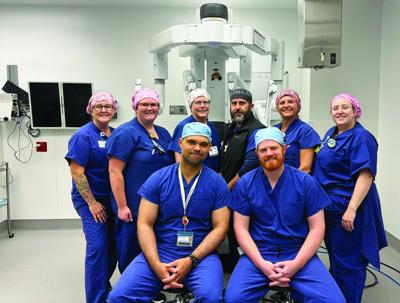LACONIA — The most important fact general surgeon David Croasdale needs to explain to patients considering robotic surgery is it’s not actually performed by a robot, but a skilled physician.
It’s a clarification he needs to verbalize frequently.
“It’s not AI,” said Croasdale, one of seven surgeons now using the da Vinci XI surgical robot new to Concord Hospital-Laconia. “It’s a device connected to instruments, controlled entirely by a surgeon and his or her assistants. It’s becoming the standard of care.”
Meet the da Vinci
The addition of the surgical robot enables Lakes Region residents access to a variety of minimally invasive procedures in urology, gynecology, thoracic and general surgery.
Benefits to patients with this type of surgical procedure include reduced pain and discomfort, less blood loss, lower risk of complications and infections, minimal scarring, and faster recovery times.
There are also advantages for the surgeon in using a robotic system, according to Croasdale.
In comparison to laparoscopic surgery, which is also minimally invasive, the da Vinci camera and instruments are better, and in general, the da Vinci offers physicians more mobility, more planes of dissection, and less fatigue from standing bedside and holding things up with the shoulders. With the robot, physicians sit at a console.
In addition to Croasdale, surgeons in Laconia are using the robot in their procedures: urologist William Santis and Michael Rezaee for robotic prostatectomy; Veronic Triaca, in urogynecology and pelvic medicine, for pelvic organ prolapse; Heidi Hallonquist and Courtney Jones in obstetrics and gynecology for hysterectomy; and Joseph Slaughter, a general surgeon who, like Croasdale, specializes in colorectal and hernia surgeries.
Concord Hospital in Concord was the first facility in the Concord Hospital Health System to procure a da Vinci. It now offers patients the newest robotic version, the da Vinci 5, with three key enhancements: increased control for intricate procedures, gentler surgeries with reduced tissue impact; and realistic 3D imaging with improved resolution and color accuracy.
“We are pleased to be among the first in New England to offer the new da Vinci 5 surgical system,” said Bill Santis, associate chief clinical officer and surgeon with the Concord Hospital Urologic Institute. “We have a mature robotic program utilizing da Vinci technology since 2009, and this new system allows us to expand our surgical capabilities and provide even better care to our patients."
Croasdale's view of the da Vinci
Croasdale lives in Laconia and was raised in Manchester.
From the time he took anatomy and physiology at Central High School, he knew he wanted to be a doctor. He landed on his specialty of colorectal surgery in his third year at Loyola University Stritch School of Medicine in Chicago.
He completed his residency at Albany Medical Center Hospital in New York, and his fellowship at Allegheny General Hospital in Pittsburgh, before joining Concord Hospital in November 2022.
Most of his training was in robotics. “It’s a lot different,” he said. “We’re on the cusp of laparoscopic surgery being phased out, and robotic surgery being phased in. It’s very much the norm now to be trained using the robot.”
Croasdale said most robotic trainings begin with simulated surgeries — without real patients — and move to surgeries performed on cadaver or pig tissue. Then the next step is observing the procedure with an attending physician.
Open, laparoscopic and robotic
In general surgery, there are three ways to approach a surgical procedure: with the open technique, making an incision and performing the surgery with the hands; laparoscopically, using small incisions and a camera; and robotically, with equipment attached to a robot, at a console away from the patient.
Croasdale performs procedures using all three methods, depending on the surgery. “I find that the robot helps me with rectal cancer and inguinal hernias and ventral hernias. Sometimes, I also use it for gallbladders and colon resections. Using the robot for rectal cancer is standard of care. It’s important.”
The new da Vinci in Laconia has allowed Croasdale to perform procedures related to rectal cancer in Laconia as opposed to Concord or Dartmouth.
Using the robot decreases the size of the incision, because the surgeon doesn’t need to fit their hands inside the surgical area. With rectal cancer and colectomies, Croasdale said some of his patients haven’t needed a colostomy bag, due to the precision of the robot.
He said many of his patients have been grateful, and commented about the very benefits hospitals tout in robotic procedures: smaller incisions, less pain, fewer infections, shorter hospital stays.
“Whatever the patient’s surgeon feels comfortable doing, that’s OK,” he added. “Many surgeons out there don’t use the robot, and do it laparoscopically, and have excellent outcomes. The robot is just a better tool if you’re trained to use it.”
Visit concordhospital.org for more information.


















(0) comments
Welcome to the discussion.
Log In
Keep it Clean. Please avoid obscene, vulgar, lewd, racist or sexually-oriented language.
PLEASE TURN OFF YOUR CAPS LOCK.
Don't Threaten. Threats of harming another person will not be tolerated.
Be Truthful. Don't knowingly lie about anyone or anything.
Be Nice. No racism, sexism or any sort of -ism that is degrading to another person.
Be Proactive. Use the 'Report' link on each comment to let us know of abusive posts.
Share with Us. We'd love to hear eyewitness accounts, the history behind an article.